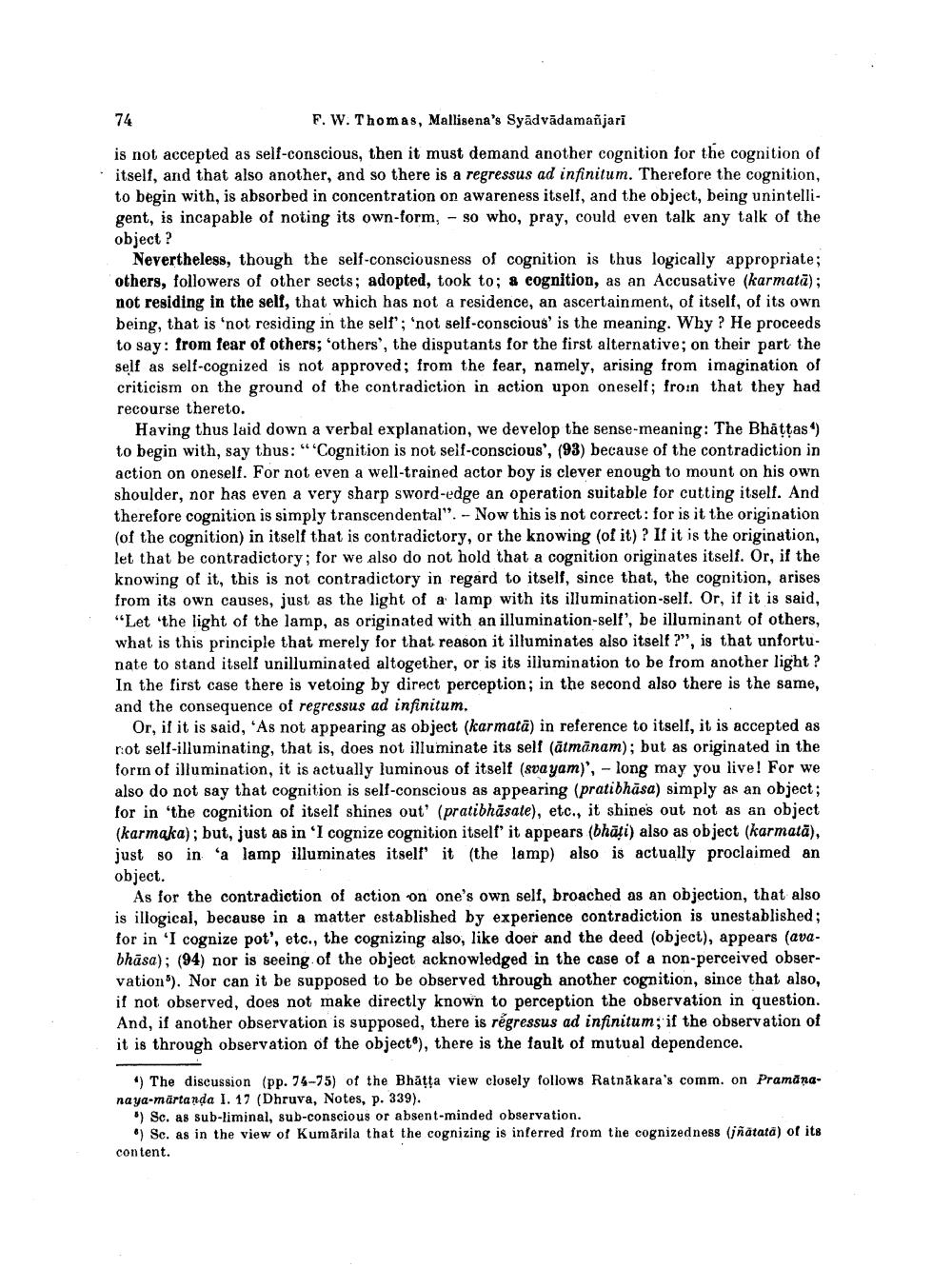________________
74
F. W. Thomas, Mallisena's Syadvādamañjari
is not accepted as self-conscious, then it must demand another cognition for the cognition of itself, and that also another, and so there is a regressus ad infinitum. Therefore the cognition, to begin with, is absorbed in concentration on awareness itself, and the object, being unintelligent, is incapable of noting its own-form, - 50 who, pray, could even talk any talk of the object?
Nevertheless, though the self-consciousness of cognition is thus logically appropriate; others, followers of other sects; adopted, took to; & cognition, as an Accusative (karmatā); not residing in the sell, that which has not a residence, an ascertainment, of itself, of its own being, that is 'not residing in the self'; 'not self-conscious' is the meaning. Why? He proceeds to say: from fear of others; others, the disputants for the first alternative; on their part the self as self-cognized is not approved; from the fear, namely, arising from imagination of criticism on the ground of the contradiction in action upon oneself; froin that they had recourse thereto.
Having thus laid down a verbal explanation, we develop the sense-meaning: The Bhättas) to begin with, say thus: “Cognition is not self-conscious', (93) because of the contradiction in action on oneself. For not even a well-trained actor boy is clever enough to mount on his own shoulder, nor has even a very sharp sword-edge an operation suitable for cutting itself. And therefore cognition is simply transcendental".- Now this is not correct: for is it the origination (of the cognition) in itself that is contradictory, or the knowing (of it)? If it is the origination, let that be contradictory; for we also do not hold that a cognition originates itself. Or, if the knowing of it, this is not contradictory in regard to itself, since that, the cognition, arises from its own causes, just as the light of a lamp with its illumination-self. Or, if it is said, "Let the light of the lamp, as originated with an illumination-sell', be illuminant of others, what is this principle that merely for that reason it illuminates also itself ?", is that unfortunate to stand itself unilluminated altogether, or is its illumination to be from another light? In the first case there is vetoing by direct perception; in the second also there is the same, and the consequence of regressus ad infinitum.
Or, if it is said, 'As not appearing as object (karmatā) in reference to itself, it is accepted as rot self-illuminating, that is, does not illuminate its self (ātmānam); but as originated in the form of illumination, it is actually luminous of itself (svayam)', - long may you live! For we also do not say that cognition is self-conscious as appearing (pratibhāsa) simply as an object; for in the cognition of itself shines out' (pratibhāsate), etc., it shines out not as an object (karmaka); but, just as in 'I cognize cognition itself it appears (bhāļi) also as object (karmatā), just so in a lamp illuminates itself it (the lamp) also is actually proclaimed an object.
As for the contradiction of action on one's own self, broached as an objection, that also is illogical, because in a matter established by experience contradiction is unestablished; for in 'I cognize pot', etc., the cognizing also, like doer and the deed (object), appears (avabhāsa); (94) nor is seeing of the object acknowledged in the case of a non-perceived observation"). Nor can it be supposed to be observed through another cognition, since that also, if not observed. does not make directly known to perception the observation in question. And, if another observation is supposed, there is régressus ad infinitum; if the observation of it is through observation of the object), there is the fault of mutual dependence.
The discussion (pp. 74-75) of the Bhatta view closely follows Ratnakara's comm. on Pramangnaya-mārtanda I. 17 (Dhruva, Notes, p. 339).
Sc. as sub-liminal, sub-conscious or absent-minded observation. *) Sc. as in the view of Kumārila that the cognizing is inferred from the cognizedness (jñātatā) of its content.




